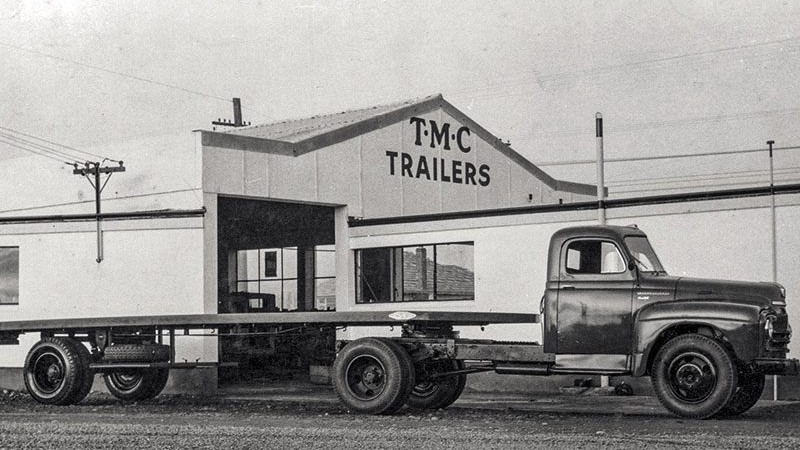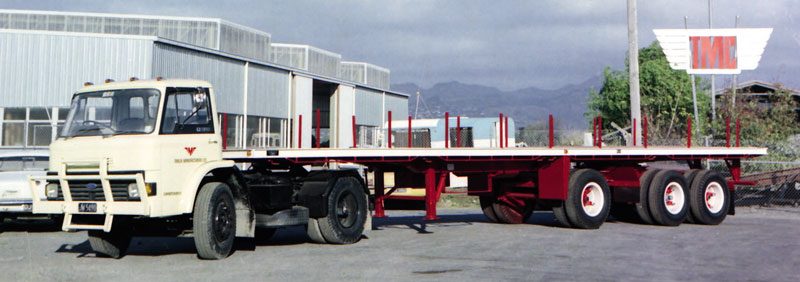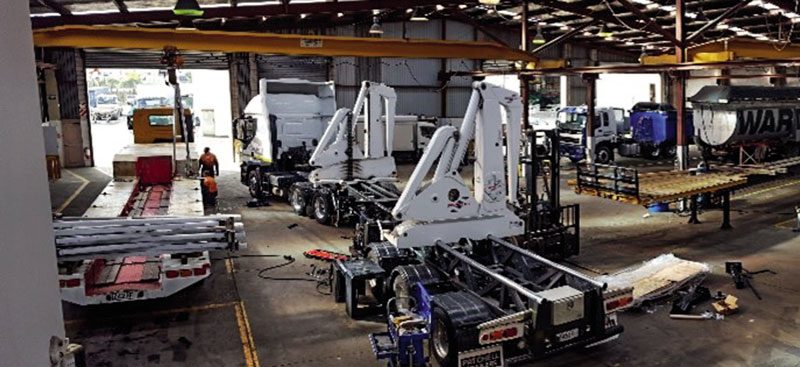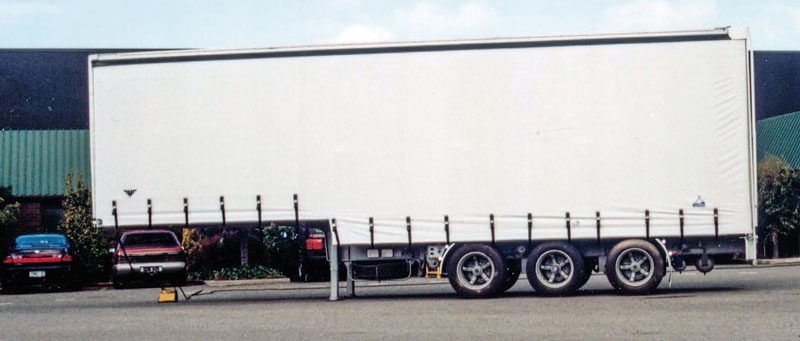
TMC is one of the longest-serving trailer manufacturers in New Zealand. In 2023, it celebrates 75 years in business – three-quarters of a century of manufacturing, servicing and repairing truck trailers and truck decks for New Zealand transport operators.
Ian Currie established TMC in 1948, shortly after his return home from World War II. Originally called the Trailer Manufacturing Company, in 1989 it changed its name to TMC Trailers.
Ian served as a mechanic with the New Zealand Scottish regiment in Guadalcanal and Bougainville, and his service involved retrieving crashed United States aircraft and stripping them of parts to keep the New Zealand planes flying. Ian’s United- States-supplied tractor unit was hooked up to a transporter, the first most other Kiwis had seen up close at that point. Ian’s experience during the war showed him the ‘pulling power’ of trailers, and this knowledge would revolutionise the New Zealand trailer building industry.
The earliest trailers Ian built included some of the very first heavy-transport trailers used on New Zealand roads.
It was a one-man-band in the early days, but 75 years later, the company has 90 employees and has continued to grow and prosper under the leadership of Ian’s son Paul and grandson Richard.
Managing director Paul Currie says TMC is a third-generation family-owned business committed to the consistent quality and innovation that has made the company an industry leader.
“We pride ourselves on delivering high-quality, long-lasting products to our customers. Our two-year unlimited-kilometre warranty, along with TMC’s legendary service, back-up and support, confirms our ongoing dedication to stand behind everything we manufacture.”
Today TMC is one of New Zealand’s largest heavy-transport engineering companies. It provides a wide selection of trailers, custom-designed and built, utilising high-strength lightweight steels and alloys.
In 2018, when TMC celebrated its 70th anniversary, it had recently completed its 4000th trailer. Built to cart general freight for 4D Group, it was a six-axle, 36-pallet-capable HPMV curtainside B-train set up for 50MAX.
Fast-forward five years and the tally is now more than 4500 trailers.
“We are renowned for our specialised trailers that give our customers the edge,” says Paul.
Paul believes being a family-owned business sets TMC apart from its competitors because customers have the continuity of dealing with the same people over the years.


“We owe our industry success to our committed and skilled team members as well as our devoted customers. With a rich 75-year legacy, some of our team have been with us for over 25 years. We’re immensely proud of our accomplishments, and I believe that if Ian were here today, he’d share in our pride.”
Paul plans to retire at the end of this year, leaving Richard to continue managing the company. Richard hopes his young son will follow him into the industry, giving TMC four generations of family involvement.
TMC’s head office and manufacturing facility is in Christchurch. The plant currently produces an average of 110 trailers and 40 truck bodies a year. Every aspect of the manufacturing process, from design and build to abrasive blasting, painting and assembling, is carried out on this site to ensure each product exceeds the client’s expectations. Across the road, a large service centre provides all general repair work and servicing.
In 2016, TMC added an Auckland facility at Wiri to support TMC’s growing North Island customer base. Along with undertaking service, repair and refurbishment work on any make of trailer, the facility also builds and fits new curtainside truck bodies.
In 2020, a new service centre was opened in Horotiu, Hamilton.
“We used to predominantly sell into the South Island market,” says Richard, “but now that we have a presence in the North Island, it’s our biggest market. We do a mixture of custom builds for clients with specific requirements as well as our standard trailer offerings.”
There is a team of 20 in Hamilton in a purpose-built facility, which includes dedicated vehicle-inspection lanes. The Auckland centre has a further 10 staff and is where new truck bodies are built.
“Both centres have workshops to support our customers, but we also service and repair other makes of trailer,” says Richard.
With an in-house team of design engineers, TMC utilises 3D CAD software and finite element analysis (FEA) to create and analyse designs. The product range consists of curtainsiders, flat decks, skeletals, tippers, transporters, panel trailers, refuse trailers and trombones.
TMC has a wide network of service and repair providers New Zealand-wide, so when service or repairs are required, it is usually not too far away.


Road Transport Industry Hall of Fame
In 2019, Paul Currie was inducted into the Road Transport Industry Hall of Fame.
Paul spent his early years in Charteris Bay at the family’s bach, where he developed a love of yachting. He got a P class dinghy for his fifth birthday and continued racing for many years in Lyttelton Harbour. In 1965, aged 15, he left St Andrew‘s College and started an apprenticeship as a tool and die maker with Alec Farrar in Christchurch. Paul’s ambition was to earn five shillings an hour – the top rate for any trade in those days. It’s safe to say he has now achieved this.
Upon completing his apprenticeship in 1969, Paul took a year off and went hunting. He spent time culling for DOC as well as hunting for meat and trophy shooting. He completed a taxidermy diploma course and started mounting animals and trophy heads that were then on-sold. He still enjoys hunting today.
Completing his time in professional hunting saw him take a role at Sinclair Melbourne, a Lyttelton marine engineering company, where he worked as a marine engineer. Jet-boat racing had by now replaced the competitive yachting days, and over the next 17 years, this became a recreational passion. The love of sailing never waned, and Paul obtained his boatmaster certificate, allowing him to captain many yachting holidays overseas.
Paul’s career at the Trailer Manufacturing Company (TMC) began in 1973. He started on the factory floor building trailers, gradually working his way up the chain.
In 1975, TMC had a shareholding change, paying out the remaining shareholders and leaving Ian and Paul as sole owners. With continued growth, 1977 saw the new TMC Trailers move from Blenheim Road to a purpose-built facility on Lunns Road. Here, Paul ran the workshop during the day and designed trailers using the old drawing machine at home in the weekends – a far cry from the AutoCAD and FEA stress analysis now used.
Sales relied on the Curries’ strong reputation for calling on customers and fostering that customer/supplier relationship.
Over the years, Paul has seen many milestones achieved, some industry-leading, including: in 1972, TMC manufactured its 1000th trailer for Transport Nelson, a two-axle pull trailer; in 1986, it moved into larger premises in Shands Road, Hornby, Christchurch, the site of its head office; in 1988, TMC built the first gull-wing truck and trailer unit in New Zealand for the Apple and Pear Board; in 1989, TMC won the best manufacturing award for its Euro Aero dynamics semi-trailer at the Hamilton transport show; in 2015, TMC expanded into Auckland, with a workshop in Wiri, and in 2020, TMC opened a service centre in Hamilton; in 2018, the company manufactured its 4000th trailer.
In 2017, Paul was awarded an honorary lifetime membership to the TTMF.



Changes over the years
Paul says there have been numerous changes in the 75 years that TMC has been operating.
In the early days, orders were usually confirmed with a handshake, and Ian undertook all the design work and then drew it out on the workshop floor for the fabricator to build. All equipment required was written on the job sheet, which was just one sheet of paper, and Ian would undertake all ordering and costing.
“There was no design certification, and the only steel grade available was mild steel, which has a tensile strength of 255MPA. The CoF was basically a quick lookover to check the lights and wheel bearings. The completed paperwork was one job sheet,” says Paul.
“Today, we have a design team of engineers designing our products using CAD software and FEA (Finite Element Analysis), and all drawings are 3D, with many A2 drawings required per trailer.”
Most parts on trailers now require design certification to NZTA rules and AS/NZ Standards, including chassis rub plates, drawbars, load restraints and brakes.
“We only use high-tensile steels that have tensile strengths up to 1400MPA.
Purchasing and BOMs (bills of materials) are generated from 3D CAD models and then entered into the ERP (enterprise resource planning) system. Parts are then purchased through the ERP system.”
Once completed, the trailers go through a comprehensive CoF inspection that includes checking all dimensions for compliance, full brake testing, lighting and load restraints. There is a compilation of all certifications required, i.e, chassis, brakes, load restraints, rub plates, drawbars.
Regulations have also undergone radical changes. In 1948, the transport regulations were a maximum speed of 40mph (56km/h) and a maximum all-up weight of 10 tons. The maximum length for a truck and trailer was 30ft (9.144m), and for a semi-trailer 36ft (10.972m). Brakes were required for units over two tons and were usually vacuum.
The maximum allowable distance for cartage was 30 miles (48km) under the Transport Licensing Act 1931 to give protection to NZ Rail.
Contrast this with the industry today, where the maximum speed is 90km/h, and the maximum all-up weight for a standard VDAM ranges from 44 to 46 tonnes. HPMV allows weights ranging from 48 tonnes up to 60 tonnes on specific routes and is dependent on the unit set-up. The maximum length is 23m, and the brakes are EBS/ABS-certified systems. There are no maximum distances, with operators able to cart throughout New Zealand.
Although times have changed, TMC remains true to its origin of innovtion and product quality.
There aren’t many trailer types TMC won’t build…
























